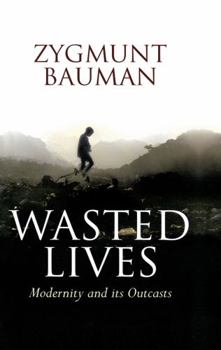Wasted Lives: Modernity and Its Outcasts
Select Format
Select Condition 
Book Overview
The production of 'human waste' - or more precisely, wasted lives, the 'superfluous' populations of migrants, refugees and other outcasts - is an inevitable outcome of modernization. It is an unavoidable side-effect of economic progress and the quest for order which is characteristic of modernity. As long as large parts of the world remained wholly or partly unaffected by modernization, they were treated by modernizing societies as lands that were able to absorb the excess of population in the 'developed countries'. Global solutions were sought, and temporarily found, to locally produced overpopulation problems. But as modernization has reached the furthest lands of the planet, 'redundant population' is produced everywhere and all localities have to bear the consequences of modernity's global triumph. They are now confronted with the need to seek - in vain, it seems - local solutions to globally produced problems. The global spread of the modernity has given rise to growing quantities of human beings who are deprived of adequate means of survival, but the planet is fast running out of places to put them. Hence the new anxieties about 'immigrants' and 'asylum seekers' and the growing role played by diffuse 'security fears' on the contemporary political agenda. With characteristic brilliance, this new book by Zygmunt Bauman unravels the impact of this transformation on our contemporary culture and politics and shows that the problem of coping with 'human waste' provides a key for understanding some otherwise baffling features of our shared life, from the strategies of global domination to the most intimate aspects of human relationships.
Format:Paperback
Language:English
ISBN:0745631657
ISBN13:9780745631653
Release Date:December 2003
Publisher:Polity Press
Length:140 Pages
Weight:0.56 lbs.
Dimensions:0.4" x 6.0" x 8.9"
Customer Reviews
1 rating
A great sociologist as a great artist
Published by Thriftbooks.com User , 20 years ago
I haven't had time to catch up with all of the amazing number of books that Bauman has been writing in his 70s, but the others aren't likely to be any better than this one. Here is a great scholar, a passionate critic, and a deeply committed humanist--someone with lots of now-possibly-outmoded virtues--writing with the freedom of an old man and the fire of a youth, tackling the character of life in the last stages of its transformation by the universal market. It is a dark picture of fragmentation and the collapse of meaning, and of the hubris of a drive towards order that suffocates on the disorder it manufactures. Bauman's argument passes seamlessly from the plunder of globalized capitalism through international refugees, urban ghettos and banlieus, and closes with some surprising connections with the world of speed dating and "Survivor." Some of the keenest bits of insight and social criticism are tossed in as parentheticals, and along the way there are extended excurses addressing even larger considerations. It is a visionary text rather than a piece of social science; Bauman's citations are more commonly to Cavino or Borges than they are to Durkheim or Parsons. (His picture of a contemporary world aestheticized by commodities is quite close to my own account in chapter 7 of "The fiction of a thinkable world," a book nobody would call sociology.) It's all the better for that. One comes away from this book with a book of one's own taking shape in thought.





